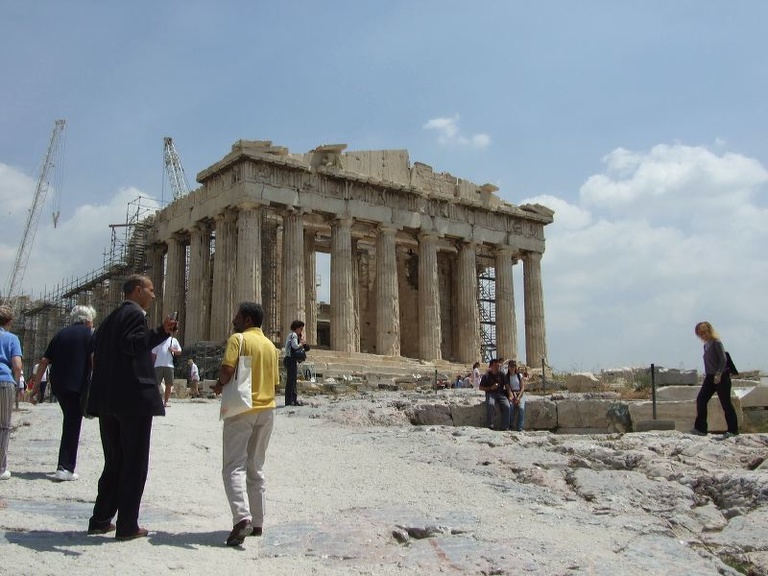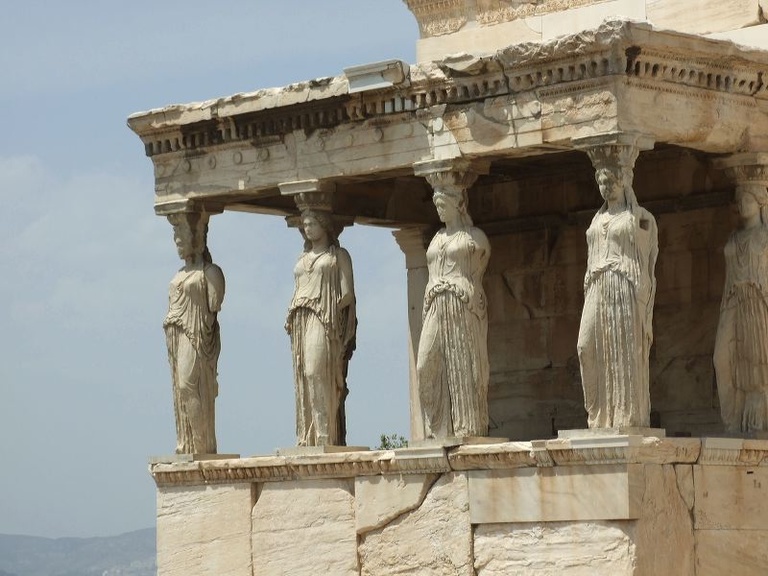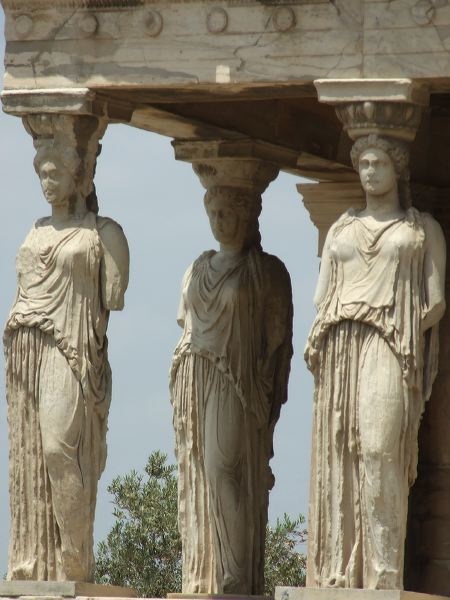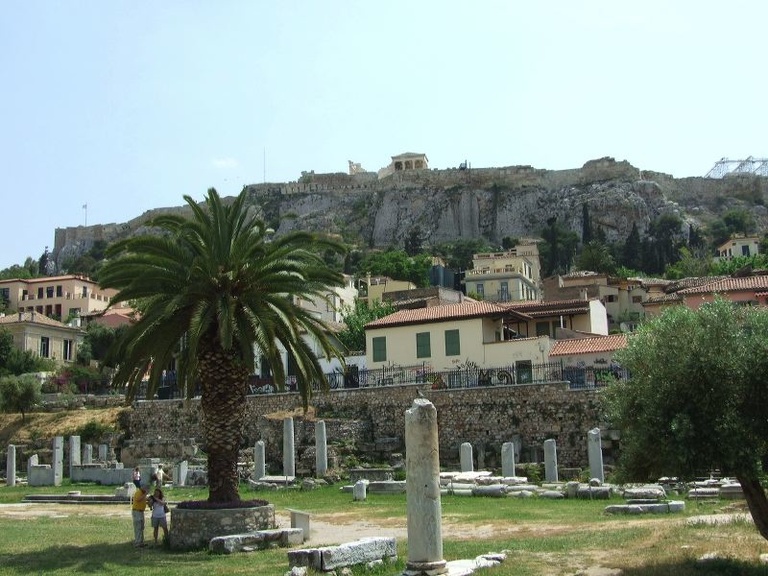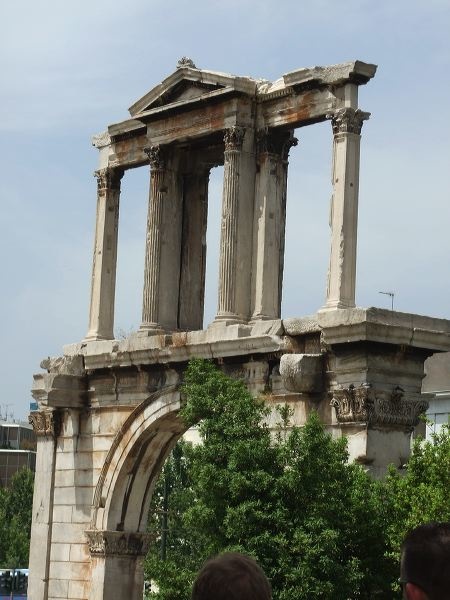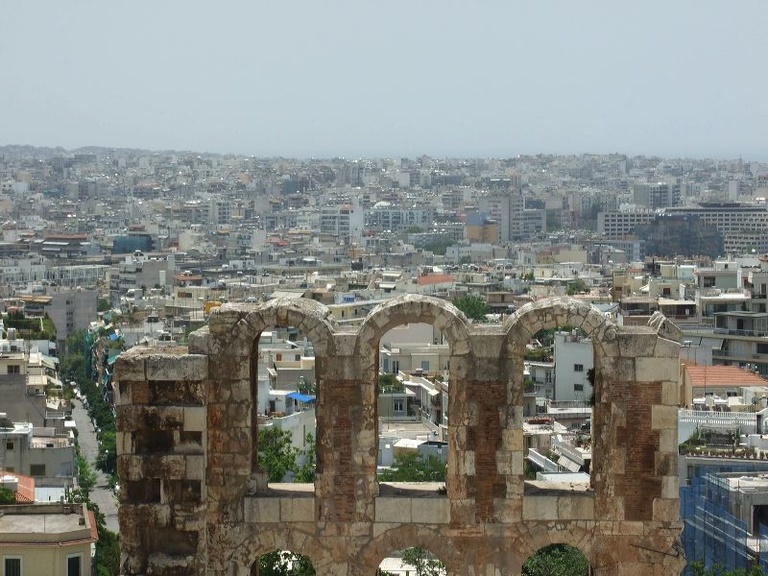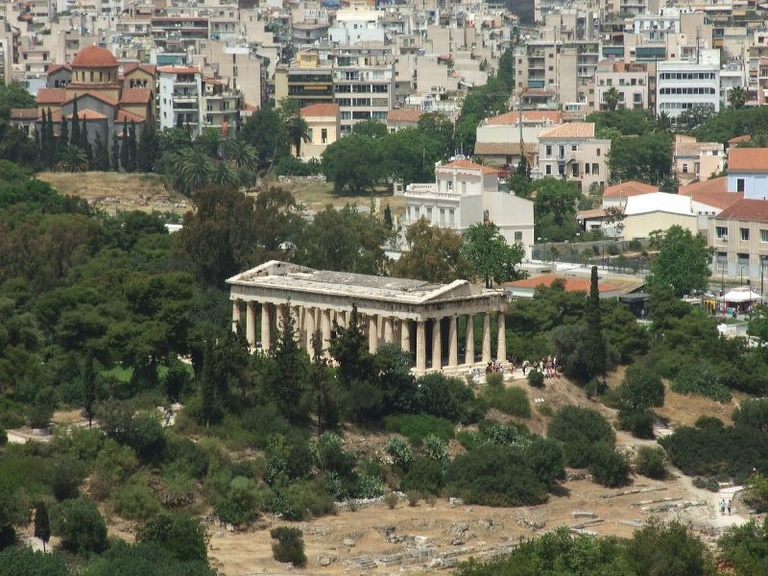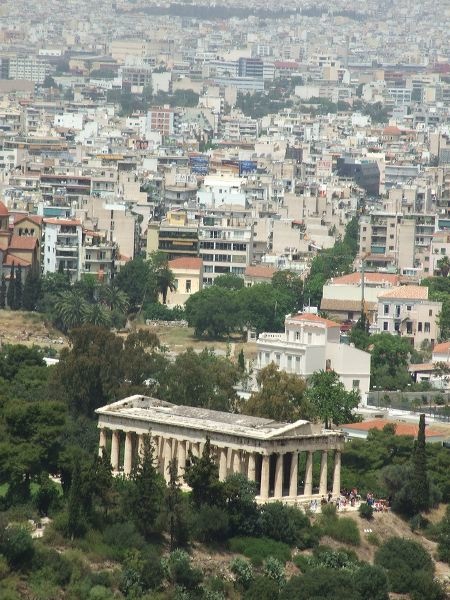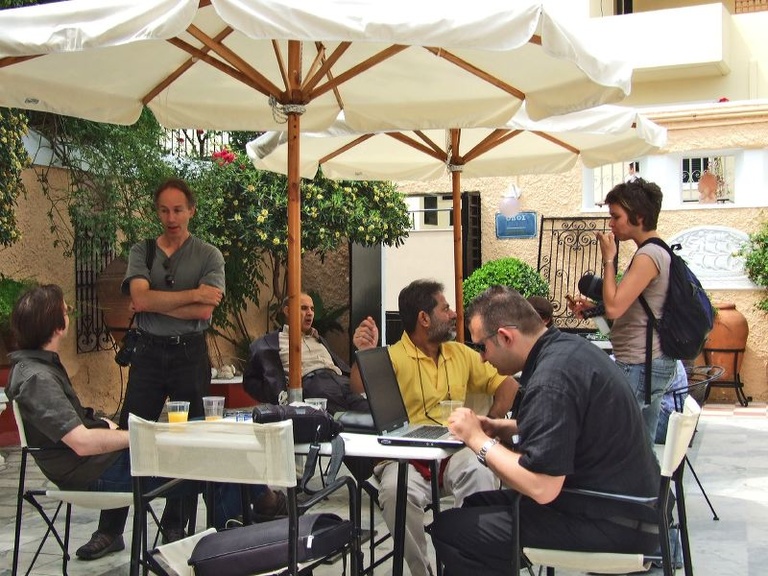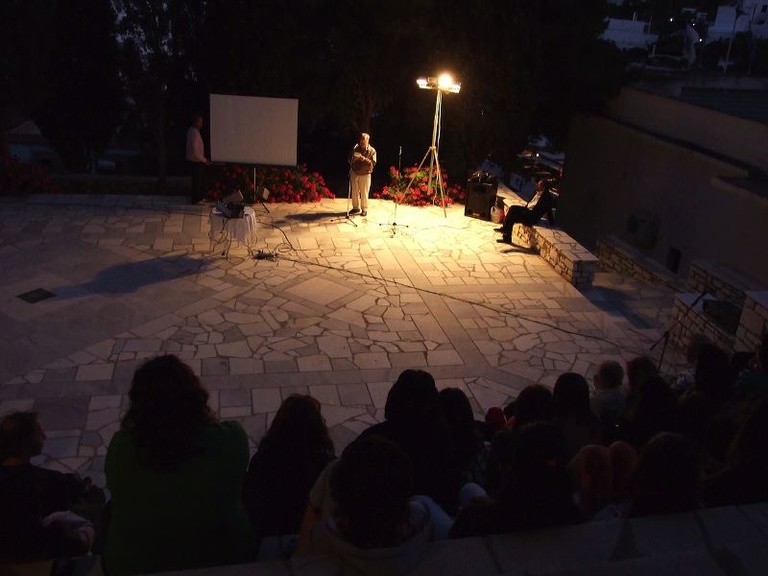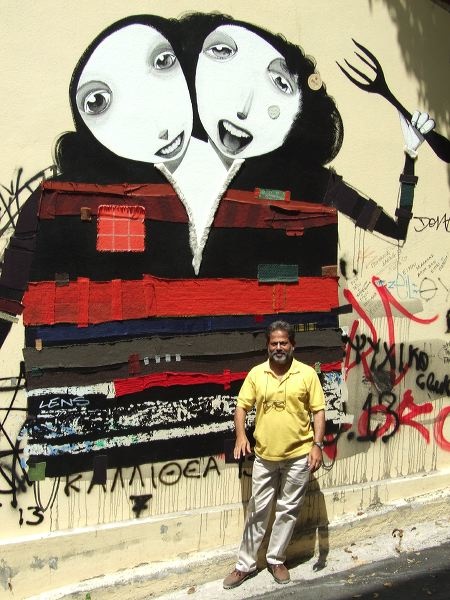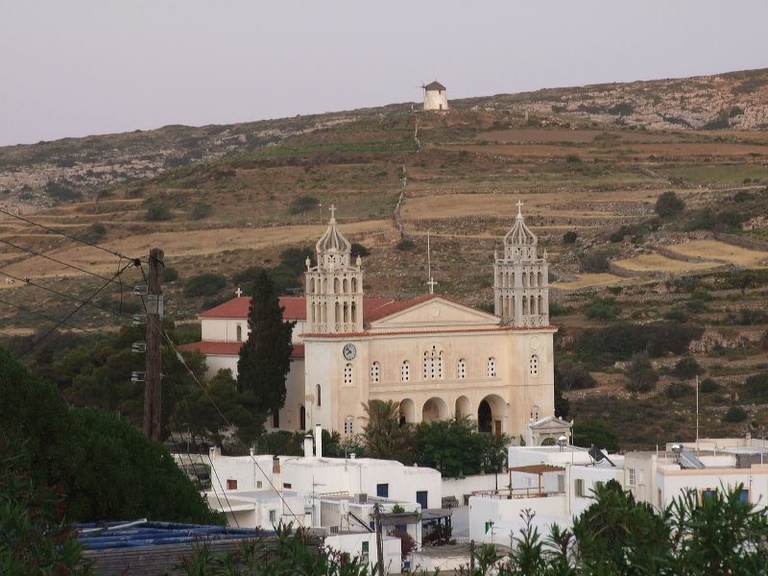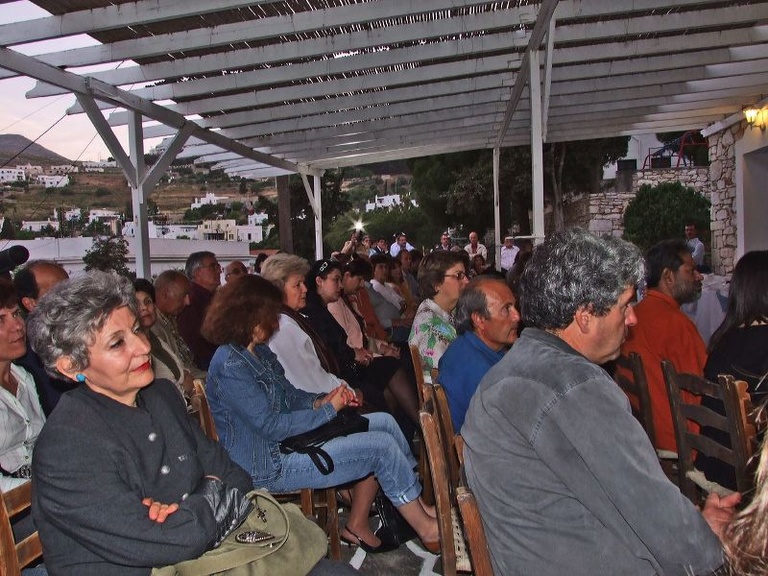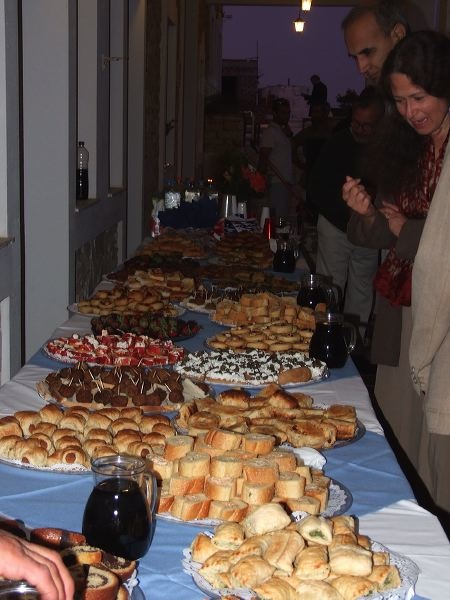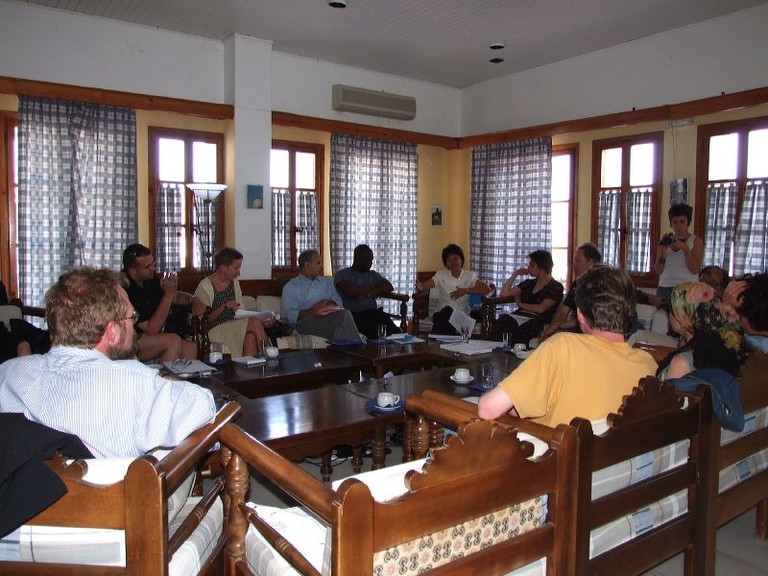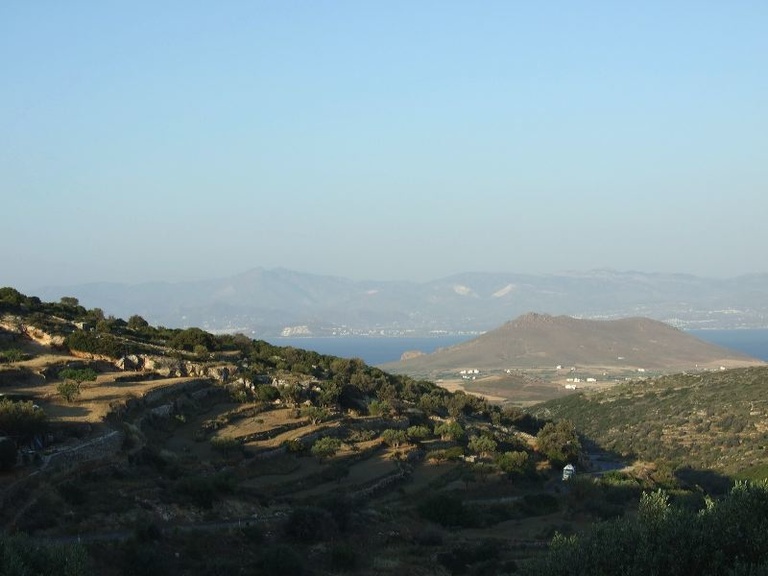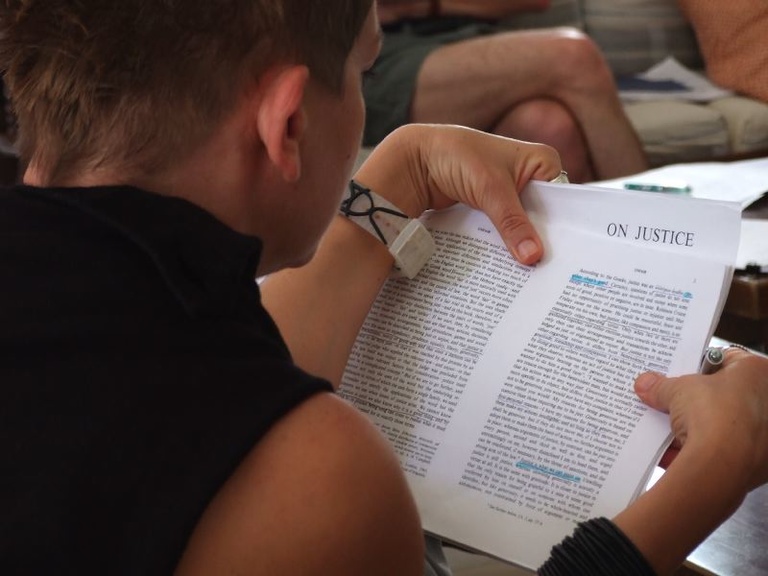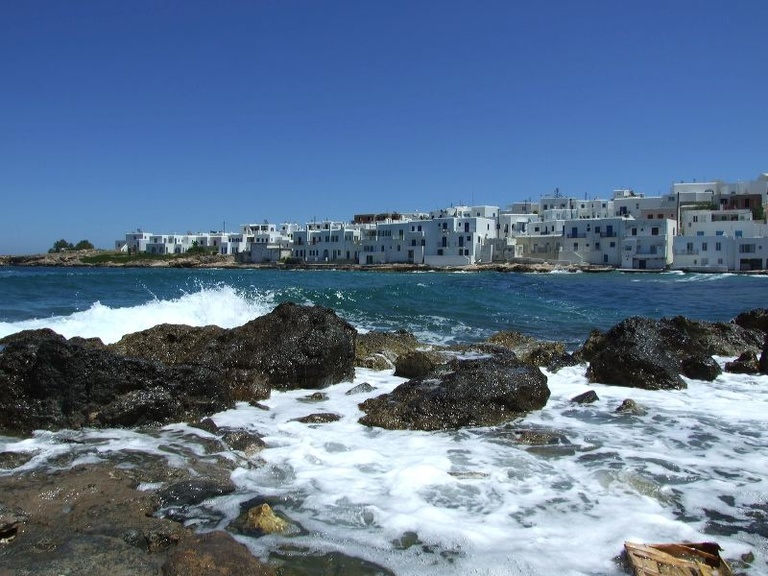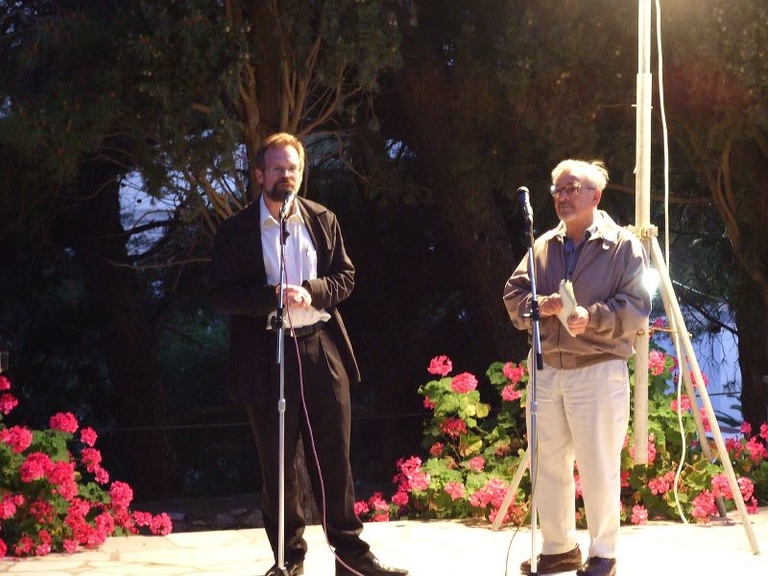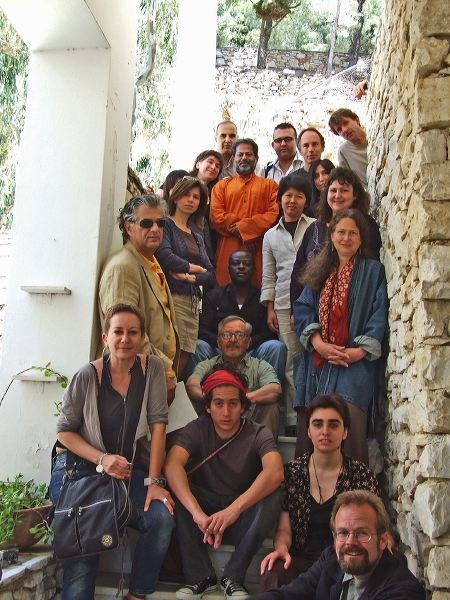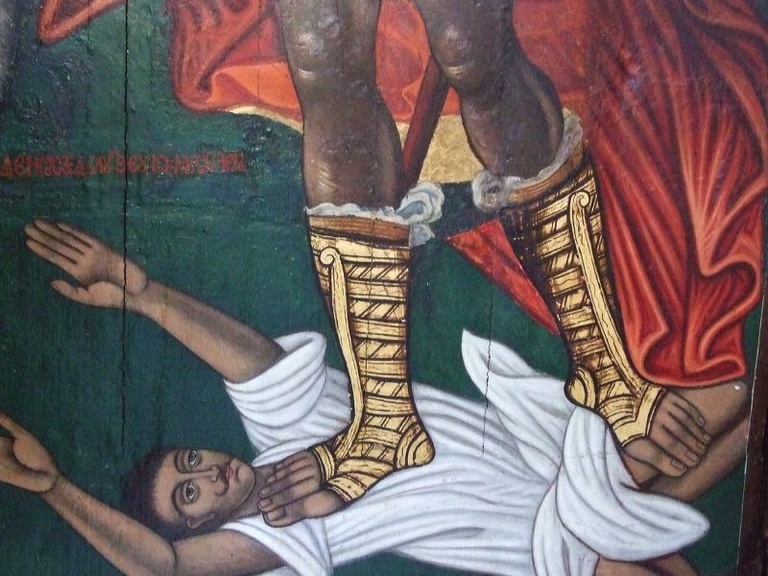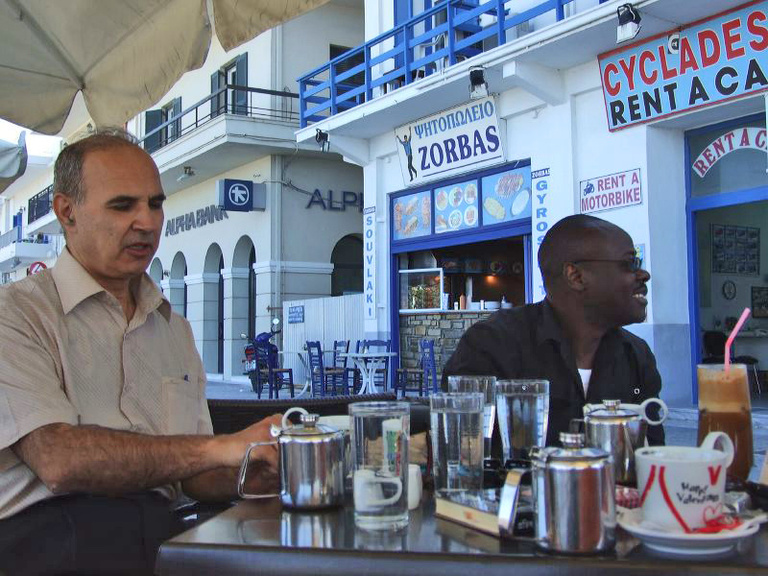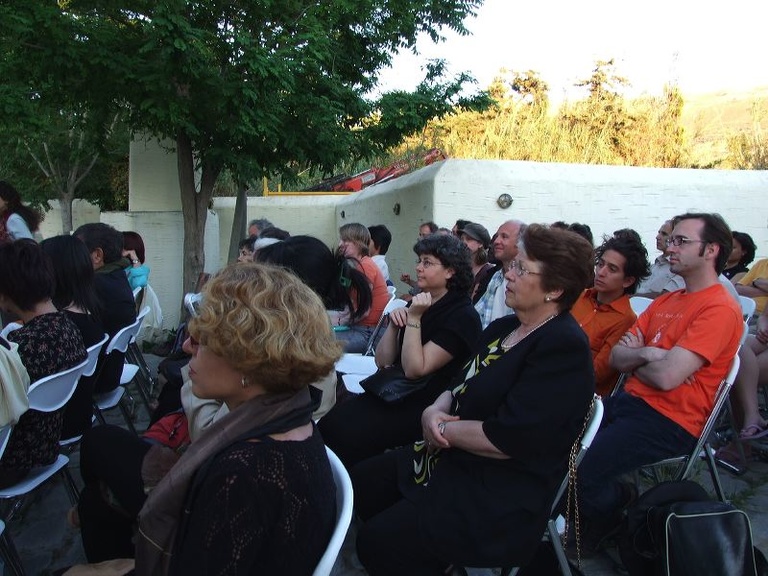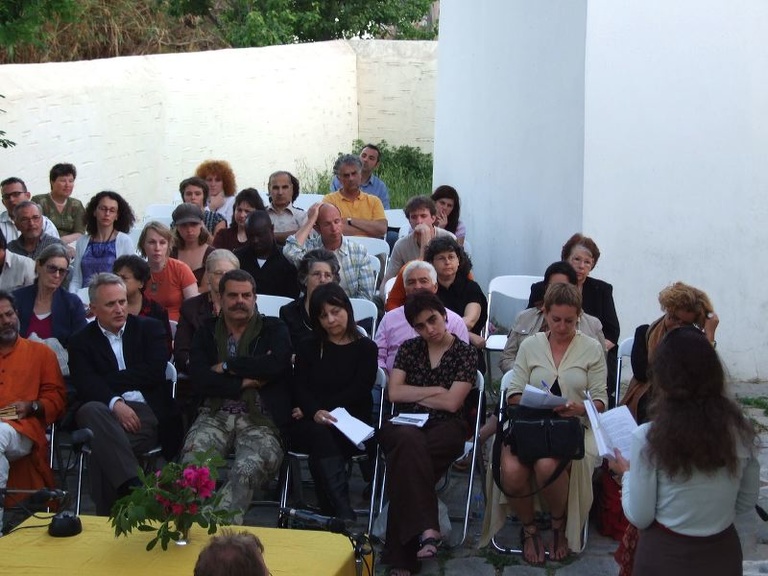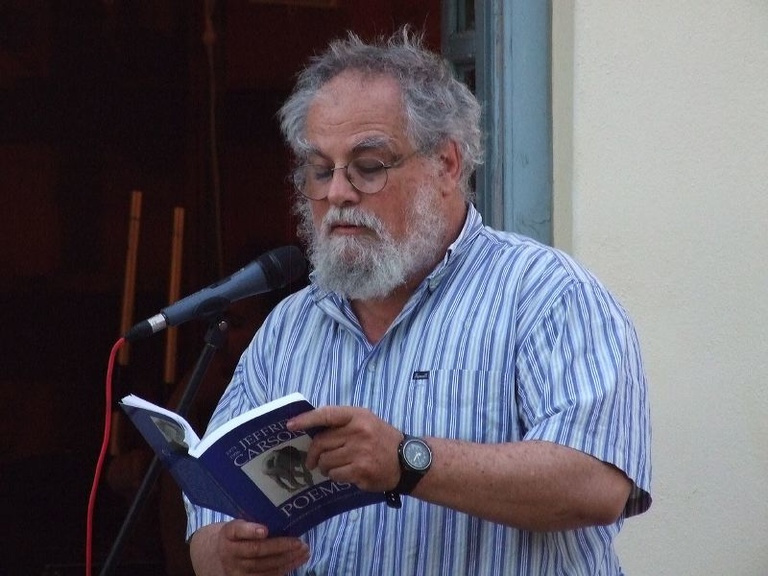Breadcrumb
- Home
- Past Programs
- International Conferences
- The New Symposium: Paros, Greece
- 2007: Justice - One or Many?
2007: Justice - One or Many?
Paros, May 7-13, 2007
The 2007 New Symposium took place May 7 – 13, 2007 on the island of Paros in the Cyclades archipelago. Convening for the second time, the New Symposium brought together fifteen writers from the U.S., Greece, and around the world to discuss a topic of interest and pressing concern to all thoughtful citizens. The topic in 2007 was “Justice.”
The New Symposium is made possible through a grant awarded to the University of Iowa’s International Writing Program from the Bureau of Educational and Cultural Affairs at the US Department of State.
The Place
The Fulbright Foundation in Greece and the Athens-based European Translation Center EKEMEL have been active partners in the New Symposium’s development and were instrumental in identifying Paros as an ideal location for the event: for millennia, this large, stately island in the center of the Cyclades has been a hub for the trading of knowledge and culture; a dwelling for poetry; and a palimpsest of diverse civilizations.
Paros, the birthplace of the famed poet Archilochos, was an ancient maritime power. Seafaring made Paros a crossroads of the Mediterranean, connected by history and commerce to the Balkans, the Near East, and North Africa. This “maritime knot” captures the energy latent in the vital exchange of ideas, know-how, and points of view—the same energy arising from the dialogues at the New Symposium.
The Topic and the Discussions
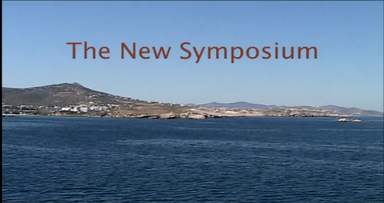
While justice may today seem a basic human need, we must assume that it is understood and evaluated in substantially different ways in different political and cultural structures. The Greco-Roman heritage, for example, symbolizes justice with a blindfold and a pair of scales, a force for egalitarianism and leveling. But are there other ways of conceiving justice? Can there be justice apart from order? When the law fails, how to summon justice? What is the proper scale on which justice should be sought—in each individual life, or in some larger time-span? Is it time to revise ground rules for justice on a shrinking globe? By convening writers, artists, and thinkers from around the world, we can test our assumptions against different concrete examples and different ways of thinking.
We asked each participant to write a short text around the theme of justice, to be distributed ahead of the symposium. Collectively these outlines will provide the participants with a common set of propositions. On Paros, we will have three discussion sessions, beginning with a roundtable on what categorical concerns must be kept front and center in a cross-cultural conversation on justice. We’ll draw the remaining days’ themes from the commonalities and natural antagonisms within the essays.
Afterwards, having had their ideas tested, participants will revise and expand their essays in light of the fresh insight and perspective brought by the conversations. These longer, more refined final pieces will be gathered and published in the form of an electronic book, second in the IWP’s “New Symposium” series.
The Participants
Daniel Alarcón
Daniel Alarcón (novelist, fiction writer; Peru/USA) is one of the most acclaimed young fiction writers in the U.S. His short story collection, War By Candlelight, was a finalist for the 2006 PEN/Hemingway Foundation Award. His writings have been published in several magazines, including The New Yorker, Harper's, and Salon, and anthologized in Best American Non-Required Reading 2004 and 2005. He serves as Associate Editor of Etiqueta Negra, an award-winning monthly published in his native Lima, Peru. A graduate of the Iowa Writers’ Workshop, former Fulbright Scholar to Peru, and the recipient of a Whiting Award for 2004, he lives in Oakland, California, where he is the Distinguished Visiting Writer at Mills College. His first novel, Lost City Radio, was published in February 2007.
Lena Divani
Lena Divani (novelist, fiction writer, playwright, scholar; Greece) is Professor of Balkan and Greek Foreign Policy at the Law School of Athens. She has published one collection of short stories, Why Don’t You Talk About Me? and five novels: The Women of Her Life, Working Boy, Singular Tense, Lies, and Nadia. In addition, she has authored several children's books and three plays: Slipping Beauty, Family Law, and Tasty. Translations of her fiction have appeared, or are forthcoming, in Spanish, Italian, Hebrew, and Turkish.
Tony Eprile
Tony Eprile (fiction writer, novelist; South Africa/USA) is the author of Temporary Sojourner and Other South African Stories (1989) and The Persistence of Memory (2004), both of which were New York Times Notable Books of the Year. Eprile has taught at Northwestern University, Williams College, Bennington College, and Lesley University. Currently, he is a visiting faculty member at the Iowa Writers' Workshop.
Emre Erdem
Emre Erdem (playwright, theatre critic, dramaturg, researcher; Turkey) is Vice President of the Theatre Education Committee (TEC) at the World Congress of ITI-UNESCO. He has worked on several “drama in education” projects for poor youth in Turkey’s earthquake zone; and he founded the One Ray of Hope Project with the help of German theatre instructors from Grips and the Dresden Young Generation Theatre. His project, Ich, Du, Und (‘I, You, And’) publishes writing by children and teenagers. He has received a Goethe Institute Artist Fellowship and served as a visiting scholar at the Universities of Essen and Lüneburg in Germany. Among his awards is the X. Sadri Alisik Young Generation Theatre Prize. In 2005, he directed the UNICEF 2005 Gala in Turkey as the Fund’s artistic advisor.
Ksenia Golubovich
Ksenia Golubovich (novelist, fiction writer, literary critic, editor, translator; Russia) has published Personae, a poetry collection, a travelogue The Serbian Parables, and the novel Wishes Granted. She contributes essays on life in contemporary Russia to several newspapers and journals, including Logos, a philosophical magazine. She recently staged a performance of Beckett’s Waiting for Godot with students from Moscow Art Theatre. She holds an MA from Moscow University, where she has taught a special course on poets and power.
Helon Habila
Helon Habila (poet, novelist; Nigeria) has published two novels, most recently Measuring Time (2007). His debut novel, Waiting for an Angel (2003), won the Commonwealth Prize for Best First Book, African Region. Among his other awards is the Caine Prize for African Writing, which he received for his short story ‘Love Poems’ (2001). He has taught at the University of East Anglia in the UK and has recently joined the faculty at George Mason University in the USA.
Stratis Haviaras
Stratis Haviaras (poet, novelist, translator; USA/Greece) teaches creative writing at the European Center for the Translation of Literature, in Athens; and at Harvard University, where has held a number of positions, including Curator of the George Edward Woodberry Poetry Foundation, and the Henry Weston Farnsworth Room. He is the founding editor of The Harvard Review and the author of the novels The Heroic Age and When the Tree Sings, as well as several collections of poems, and a translator of C.P. Cavafy .
Jane Hirshfield
Jane Hirshfield (poet, essayist; USA) has published six books of poetry, most recently After (2006); a collection of essays, Nine Gates; and three major anthologies collecting the work of historical women poets from a wide range of cultural and spiritual traditions. Her work has appeared in The New Yorker, The Atlantic, The Times Literary Supplement, The Nation, and five editions of The Best American Poetry. Her books have been finalists for the National Book Critics Circle Award and England’s T.S. Eliot Prize, and other honors include The Poetry Center Book Award, The California Book Award, fellowships from the National Endowment for the Arts, Guggenheim and Rockefeller Foundations, and the 70th Academy Fellowship for distinguished poetic achievement from The Academy of American Poets.
Mohamed Magani
Mohamed Magani (novelist, essayist, fiction writer; Algeria- IWP 1985) is the author of the novels La faille du ciel, which won the Grand Prix Littéraire International de la Ville d’Alger, Esthétique de boucher, Un temps berlinois, Le refuge des ruines, Une guerre se meurt and the short story collections An Icelandic Dream and Please Pardon Our Appearance. Among his essays are Histoire et sociologie chez Ibn Khaldoun and Enseignement primaire, où en sommes-nous? His most recent novels are Scène de pêche en Algérie [ 'A fishing scene in Algeria'] and Le bruit d'une goutte d'eau. His works have been translated into German, Italian, English, SerboCroatian and Dutch. From 1995 - 2000 he was a writer-in-exile in Berlin, at the invitation of the International Parliament of Writers and the city of Berlin. He founded the Algerian PEN Club and is a Board member of International PEN. He lives in Algiers.
Ma Thida
Ma Thida (fiction writer, physician, activist; Burma) was in medical school when Burma’s military junta shut down the universities. She then served as a health care provider and editor for the non-violent National League for Democracy. Her many short stories containing disguised criticism of the Burmese government led to six years in solitary confinement. Among the charges against her were “endangering public tranquility and distributing unlawful literature”. In 1999 she was pardoned and released on humanitarian grounds. She lives in Yangon, where she is the editor of the youth magazine Teen and works as a surgeon at the Muslim Free Hospital, which treats poor patients at no cost.
Barry Sanders
Barry Sanders (nonfiction writer; USA) is Professor Emeritus of the History of Ideas at Pitzer College in Claremont, California, and currently a Fulbright Senior Fellow. He has authored and co-authored more than a dozen books on orality and culture, some of the most seminal being ABC: The Alphabetization of the Popular Mind (1986), with Ivan Illich; A is for Ox: Violence, Electronic Media, and the Silencing Of The Written Word (1994), which was nominated for the Pulitzer Prize; Sudden Glory: Laughter as Subversive History (1995); and The Private Death of Public Discourse (1998). His most recent work is Alienable Rights: The Exclusion of African Americans in a White Man's Land, 1619-2000, nominated in 2004 for the Pulitzer Prize.
Subodh Sarkar
Subodh Sarkar (poet, translator, editor; India) is a leading Indian Bengali poet, the author of twenty-two books: nineteen volumes of poetry, two translations, and one travelogue on America. Among his awards is the West Bengal Bangla Academy Award (2000). Sarkar has appeared at international poetry festivals around the world. He has worked with Daniel Weissbort at Iowa and Bhopal, and with Chilean poet Raul Jurita—their audio-cassette project is a first Indo-Latin American collaboration of its kind. Sarkar is the Editor of Bhashanagar, a Bangla magazine of Indian poetry with occasional English issues. He is Reader in English at City College, Kolkata.
Ersi Sotiropoulos
Ersi Sotiropoulos (poet, novelist, fiction writer; Greece) recently won the National Literature Prize and the Book Critics’ Award from the literature magazine Diavaso in 2000 for her novel, Zigzag Through the Bitter-Orange Trees. It is the first time that a novel in Greece has won both of these prestigious awards. Sotiropoulos studied philosophy and cultural anthropology in Florence and was a cultural attaché in the Greek embassy in Rome. She has written scripts for film and television and participated in several exhibitions of visual and concrete poetry. Her work has been translated into many languages. She has been a fellow at the University of Iowa’s International Writing Program, at Schloss Wiepersdorf in Germany, at Princeton University, at Sacatar Foundation in Brazil, and elsewhere. She lives in Athens.
Anastassis Vistonitis
Anastassis Vistonitis (poet, essayist, journalist, translator; Greece) has published ten books of poetry, three volumes of essays, three travelogues, a book of short stories, and a book of translations of the Chinese poet Li He. He served as Vice-President of Greek Collecting Society of Literary Works (OSDEL) for six years. From 1996 to 2001 Vistonitis was a board member of the E.W.C. (European Writers' Congress), and in 2003 was elected Vice President of its administrative board. He was the General Editor of the candidature file of Athens for the Olympic Games of 2004. His creative work has been translated into 15 languages.
Directing The New Symposium
Christopher Merrill
Christopher Merrill. Director of the International Writing Program at the University of Iowa. Merrill’s books include four collections of poetry, Brilliant Water, Workbook, Fevers & Tides, and Watch Fire, for which he received the Peter I. B. Lavan Younger Poets Award from the Academy of American Poets; translations of Aleš Debeljak’s Anxious Moments and The City and the Child; several edited volumes, among them, The Forgotten Language: Contemporary Poets and Nature and From the Faraway Nearby: Georgia O’Keeffe as Icon; and four books of nonfiction, The Grass of Another Country: A Journey Through the World of Soccer, The Old Bridge: The Third Balkan War and the Age of the Refugee, Only the Nails Remain: Scenes from the Balkan Wars, and Things of the Hidden God: Journey to the Holy Mountain, which won the 2005 Kostas Kyriazis Award, Greece’s most prestigious journalism award. His work has been translated into twenty-five languages.
Artemis A. Zenetou
Artemis A. Zenetou, Executive Director, Fulbright Foundation in Greece. Artemis A. In the Foundation's 59-year history, she is the first Greek citizen and woman to head the Foundation. Educated in Greece and in the United States, in History of Art, Museum Studies and Management of Non-for Profit Organizations. She spent 18 years in the U.S. and has worked for several national and international organizations including the: Federal Reserve Bank- Cultural Affairs, Boston; Smithsonian Institution, U.S. Presidential Inaugural Committee for Art and Cultural Initiatives, and the World Bank where she established the first Art and Cultural Program. She has developed cultural and educational programs internationally and has published extensively on museology, arts administration and contemporary art and has co-authored two books: Museums: a Place To Work (Routledge Press, 1996) and Gender Perspectives: Essays on Women in Museums, (Smithsonian Press 1991). She served on the Board of the Cultural Olympiad, Ministry of Cultural Affairs (2000-2004) and on the Advisory Committee on Cultural Diplomacy at the Ministry of Foreign Affairs (2002-2004). She is a Board member of Ecofilms - Rodos International Films & Visual Arts Festival.

